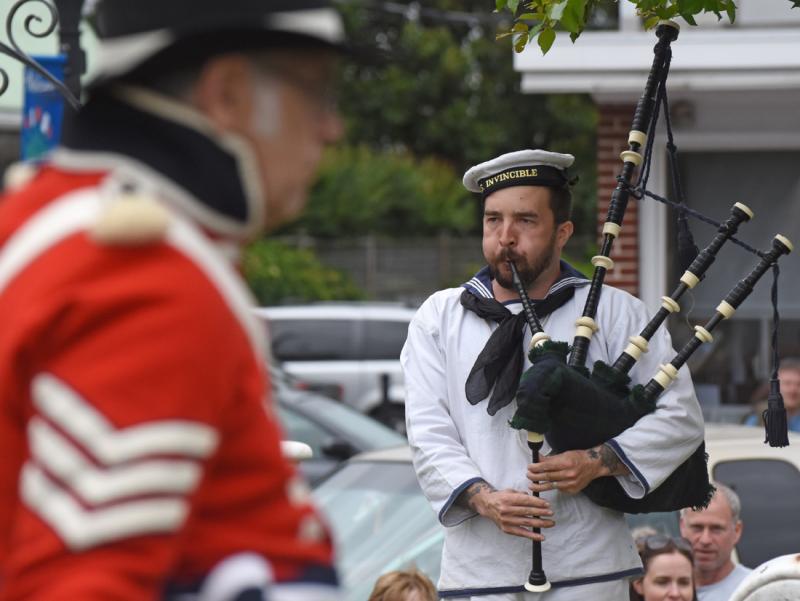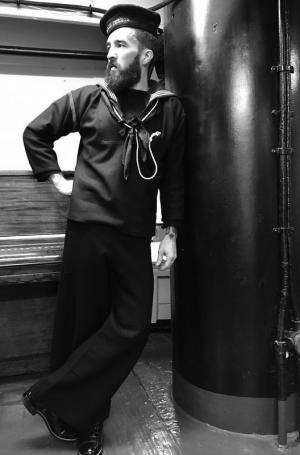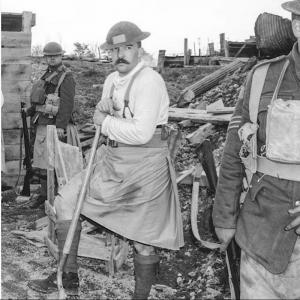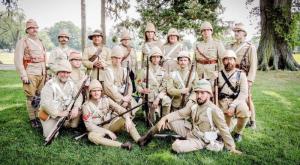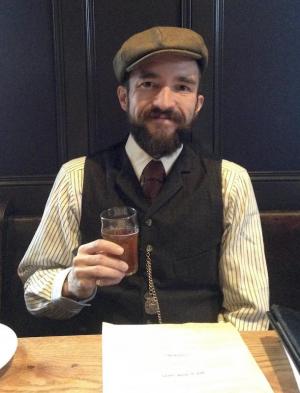Andrew Lyter: A young man doing historic things
Standing next to what remains of the HMS DeBraak's hull in Cape Henlopen State Park, historian Andrew Lyter said it was the opportunity to give lectures on the ship's history that brought him and his wife to Lewes a few years ago.
"British shipwrecks are few and far between," said Lyter. "This was hands down a rare opportunity."
Lyter quickly spouts off the ship's history and describes its current state of rest in a small, damp building in the park. All that remains of the ship is the keel and a portion of the starboard side, which he said is preserved through static conservation.
He then points to the sprinklers that periodically spray the ship to keep the wood moist, because if it dried out, it would just fall apart, he said.
"It's like the Rainforest Cafe in here," he said, laughing, while dressed in late Victorian and early Edwardian civilian attire – wool cap, wool pants, wool vest and a thick mustache. "This is what really brought my wife and me down here," he said, genuinely stoked to be talking about the historic ship.
Lyter, 29, grew up in York, Pa. He received a history degree from West Chester University. Lyter said a high school project designed to get students thinking about their future got him interested in history, and he's known since he was a young teenager that he wanted to spend his life as a historian.
"I thought maybe a museum curator," he said. "I didn't go into college my freshman year not knowing what I wanted to do. From day one, I was doing history."
Lyter said growing up in York, he was inundated with Civil War-era history, but he was always drawn to the history of the late Victorian-era, 1880s to 1920s, specifically British maritime history. He said some of his earliest memories are in Cape Cod sailing and learning maritime lore.
"I can remember the first museum I ever visited. It was the Nantucket Whaling Museum," he said. "I've always been interested by the ocean and sailing."
Being a professional historian is a labor of love, and since graduating from college Lyter has been able to live that life, without becoming a teacher. He said he's tossed around the idea – his mom and brother are both teachers – but he said he prefers an audience and using performance to teach.
"I do have bills to pay, and it's an uphill battle being a historian, but fortunately I've been able to work at four different historical sites," said Lyter, who in addition to giving lectures on the DeBraak for the state, works at the Zwaanendael Museum and the Lewes Historical Society.
Immediately prior to living and working in Lewes, Lyter was working in Philadelphia at the Independence Seaport Museum.
When Lyter isn't working as a historian, he's volunteering for historic re-enactments and living history events. He estimates he's volunteered at 20 different historic venues, and he said he prefers the term living historian to re-enactor. He said it's about using period items to teach people.
He said he's playing with the historical society's Lewes Base Ball Club this year, and he crews on the Kalmar Nyckel when the ship is in Lewes.
As part of his job, Lyter helps plan local events. For example, this Memorial Day will mark his third year helping plan the Zwaanendael's A Sailor's Life for Me event. He said a lot of his history-loving friends will be in town that weekend.
"Last year we had close to 2,000 visitors," he said. "It's really a rare opportunity."
Another event Lyter has been working on is something new called Tavern Talks. He said beginning in April, it will take place in the Ryves Holt House on Second Street in Lewes. These will be historical debates in the manner of the 1770s, he said.
"I'm always trying to find a way to bring more folks into what life was like," he said. "People want to be entertained."
Perhaps not surprisingly, Lyter plays an instrument traditionally thought of as historic – the bagpipes, which he has played since he was 13. He said York has two bagpipe bands, and he and three of his friends joined one. He said lessons were free of charge as long as the young men committed themselves to continuing the bagpipe tradition with lessons of their own.
Lyter said it takes a solid three to five years to really learn how to play the bagpipes. He's played in five bagpipe bands, which he said, "have opened a lot of doors and introduced me to a lot of wild and weird people."
Lyter said one memorable experience the bagpipes brought him was a trip to Montreal as a member of a 15-person band to play for a Scottish Canadian regiment that's been in existence since before the Battle of Waterloo in 1815. The bagpipe band, with members from Maine to Montana, had been performing a historic re-enactment of this regiment. Lyter said the sergeant of the regiment asked them to perform, and he performed in the sergeants' mess, after which, he said, they broke out a bottle of scotch that had been reserved for the queen.
"The room oozed so much history," Lyter said. "It was a big deal. It was an amazing honor."
Locally, Lyter has been the bagpiper during a remembrance ceremony for the lost crew of the DeBraak. He said he would like to get a bagpipe band going in Lewes and perform locally.
"There are enough events and parades," he said. "I'd do it in a heartbeat."
In the not-too-distant future, Lyter, his wife and some members of his history-loving family will travel to England. He's really looking forward to the trip and he's already been warned by his wife that she doesn't want to spend the whole trip visiting every old castle they come across.
"She appreciates the historical significance of things," he said, with a hey-she-married-me-didn't-she laugh, before adding, "She's big into Harry Potter, so we'll mix some of that into the trip too."
Chris Flood has been working for the Cape Gazette since early 2014. He currently covers Rehoboth Beach and Henlopen Acres, but has also covered Dewey Beach and the state government. He covers environmental stories, business stories and random stories on subjects he finds interesting, and he also writes a column called Choppin’ Wood that runs every other week. He’s a graduate of the University of Maine and the Landing School of Boat Building & Design.














